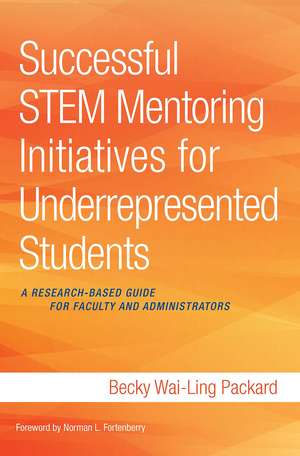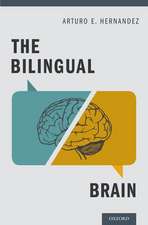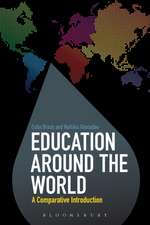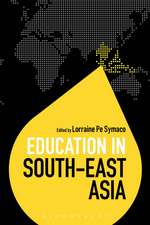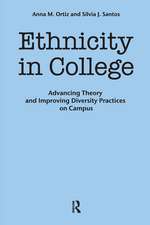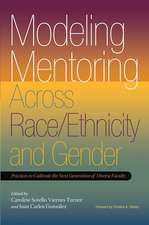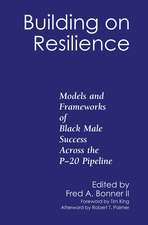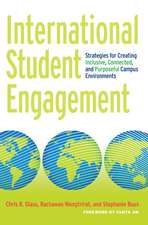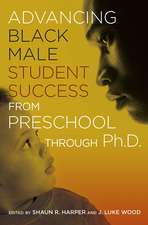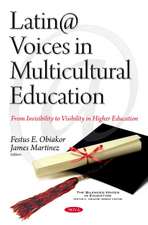Successful STEM Mentoring Initiatives for Underrepresented Students: A Research-Based Guide for Faculty and Administrators
Autor Becky Wai-Ling Packarden Limba Engleză Paperback – 17 dec 2015
| Toate formatele și edițiile | Preț | Express |
|---|---|---|
| Paperback (1) | 300.28 lei 6-8 săpt. | |
| Taylor & Francis – 17 dec 2015 | 300.28 lei 6-8 săpt. | |
| Hardback (1) | 997.11 lei 6-8 săpt. | |
| Taylor & Francis – 21 dec 2015 | 997.11 lei 6-8 săpt. |
Preț: 300.28 lei
Nou
Puncte Express: 450
Preț estimativ în valută:
57.46€ • 59.37$ • 47.80£
57.46€ • 59.37$ • 47.80£
Carte tipărită la comandă
Livrare economică 19 martie-02 aprilie
Preluare comenzi: 021 569.72.76
Specificații
ISBN-13: 9781620362969
ISBN-10: 1620362961
Pagini: 158
Dimensiuni: 152 x 229 x 10 mm
Greutate: 0.23 kg
Ediția:1
Editura: Taylor & Francis
Colecția Routledge
Locul publicării:Oxford, United Kingdom
ISBN-10: 1620362961
Pagini: 158
Dimensiuni: 152 x 229 x 10 mm
Greutate: 0.23 kg
Ediția:1
Editura: Taylor & Francis
Colecția Routledge
Locul publicării:Oxford, United Kingdom
Public țintă
Postgraduate and Professional Practice & DevelopmentNotă biografică
Becky Wai-Ling Packard is Professor of Psychology and Education at Mount Holyoke College, and has studied mentoring, diversity, and STEM persistence for 20 years. A trusted resource in the field, Packard has provided expert consulting to a variety of campuses in addition to state-level and national-level audiences. In 2005, she earned the federal government’s top honor for early career scientists, the Presidential Early Career Award for Scientists and Engineers. Her work has been funded by the National Science Foundation and Google. A first-generation college graduate and person of color, Packard completed the Summer Research Opportunity Program and earned her bachelor’s degree from the University of Michigan-Ann Arbor. In 1999, after she earned her Ph.D. from Michigan State University, she joined the faculty at Mount Holyoke College. On her campus, she has led leadership, mentoring, and faculty teaching initiatives in her capacity as the Director of the Harriet L. and Paul M. Weissman Center for Leadership.
Cuprins
Acknowledgements Foreword Introduction: • Why do we need to recruit students into STEM and help them persist? • Why is diversity in STEM valuable? • Why is mentoring a worthy investment for STEM departments? • What will you gain from this book? 1. Map the Landscape, Choose a Focus • Map the landscape using the ecological model • Primary factors influencing persistence. Obstacles and opportunities • The big picture. The learning environment and department climate • Reader next steps. Choose a focus 2. Mentoring With Intention. What’s Your Strategy? • Intentional mentoring • Approaches to mentoring • Making decisions. Intensity and selectivity • Start small with a pilot • Reader next steps. Create a road map 3. What Works (and Why. During the Transition to College • What works and why • Improving the departmental climate for new students • Case study with Bill Gomez • Reader next steps. Explore your options during the transition to college 4. What Works (and Why. During the Transition to a STEM major • What works and why • Improving departmental climate for prospective and current majors • Case study with Susan Mason • Reader next steps. Explore your options during the transition to a STEM major 5. What Works (and Why. During the Transition to the Workplace or Graduate Studies • What Works and why • Improving departmental climate for upper-level students • Case Study with Mark Sanderson • Reader next steps. Explore your options for the transition to the workplace or graduate studies 6. Difficult Mentoring Moments. Framing Messages to Improve Impact • Why some mentoring moments are difficult • The benefits of mentor orientation sessions and other forms of practice • Reader next steps. Invest in conversations about difficult mentoring moments 7. Conversations Among Colleagues. Departmental Climate as a Collective Project • Changing climate, one conversation at a time • Tracking your progress • Reader next steps. Plan your department conversation Conclusion • Start small • The tipping point • Who do you want to be? • Reader next steps. Summarize what you have learned Resources • Professional organizations and consortia • Statistics, strategies, and tool kits • Recommended books and reports Index
Recenzii
“Successful STEM Mentoring Initiatives for Underrepresented Students illustrates and elucidates Packard’s considerable expertise and scholarship on an enduring and, for some disciplines and education settings, a seemingly intractable set of issues. Rather than ‘tinkering around the edges’ by addressing only several variables, Packard tackles underrepresentation from the perspectives of both students and of the education system they will encounter. This comprehensive systems approach is refreshing and, in many ways, unique. It offers evidence-based advice to those in higher education who are undertaking the critically important work of increasing representation of historically underserved and unserved students and helps readers understand where and how their roles and actions must be based on efforts that have preceded their own and how their own work will influence others in the system as students pass through it on their ways to STEM careers. It is a refreshing and much-needed approach.”
Jay B. Labov, Senior Advisor for Education and Communication
National Academies of Sciences, Engineering, and Medicine
"In Successful STEM Mentoring Initiatives for Underrepresented Students, Becky Wai-Ling Packard addresses a longtime need of those seeking to develop more diverse and inclusive scientific and technical communities. To ensure access to useful mentoring for students approaching these communities, she provides a wonderful compendium of research-based strategies and insights that can be adapted in a wide variety of settings. I am grateful to her, as a colleague and collaborator, for having taken the time to provide actionable advice to the many who are in a position to provide mentoring that can improve learning, scientific discovery, innovation, technology development, and lives."
Carol B. Muller, Founder, MentorNet, and Executive Director, WISE Ventures
Stanford University
"Using research-based practices and case studies, Becky Wai-Ling Packard makes the case that mentoring with intention can increase college and university enrollment and graduation rates of all students in STEM -- particularly women, students of color, first-generation college students, or community college transfers. She provides a critical tool that helps faculty and administrators to first examine their departments to identify obstacles to student’s success and then implement appropriate, tested strategies, including improving everyday communications and interactions with students, as well as, teaching and advising practices. More importantly, this book is about creating an inclusive environment that makes students from all backgrounds feel like they belong in STEM."
Yolanda S. George, Deputy Director Education and Human Resources Programs
American Association for the Advancement of Science (AAAS)
"To our chagrin, building STEM programs that proportionally include students from historically underrepresented groups has proven to be more difficult than rocket science. Yet research and empirical evidence reveal quite clearly how to create robust STEM settings in which everyone can thrive. Dr. Packard, an award-winning scholar and educator, expertly guides us through the steps of how focusing on mentoring can create and sustain inclusive STEM classrooms and departments. I have every confidence that this book will lead scientists and STEM educators to engage in empirically proven inclusive practices, one step at a time, to effect the essential changes in STEM that Dr. Packard so ably champions."
Wendy E. Raymond, Ph.D., Vice President for Academic Affairs and Dean of Faculty, Professor of Biology, Chair, National Science Foundation Committee on Equal Opportunity in Science and Engineering
Davidson College
"Professor Becky Packard’s book Successful STEM Mentoring Initiatives for Underrepresented Students: A Research-Based Guide for Faculty and Administrators is an important resource and handbook for all academics interested in increasing the diversity of the sciences. It serves at once as a compendium of the extensive literature from social psychology, education and other fields that documents the problems underrepresented students face and interventions that are working, and as a guide through that literature for those less familiar with it. Most importantly, Professor Packard presents adaptable plans for a structured approach to effecting change at three key points in an undergraduate student’s career: entry into college, declaration of a STEM major, and post-graduate planning. With its focus on mentoring as a relationship, there are concrete ideas here for everyone working to solve these difficult societal problems."
Mark M. Levandoski, Professor of Chemistry
Grinnell College
"This is a book about why and how. It explains why STEM student support structures, broadly defined as mentoring, are critical to the strength of undergraduate and graduate education in STEM fields. It explains, in a clear and evidence-based narrative, how individuals and departments can provide mentoring to enhance persistence of all STEM students in their respective fields, in particular those students who perceive themselves or are perceived by others as underrepresented in their fields. Becky Packard provides guidance to help individuals and departments improve and expand their mentoring of STEM students. All STEM educators should read this book."
David Gross, Professor of Biochemistry and Molecular Biology
University of Massachusetts, Amherst
“For members of populations underrepresented in STEM (i.e., women of all ethnicities, persons from underserved racial and ethnic groups, and persons with disabilities) purposeful and active mentoring is particularly important.
Packard’s advice spans the academic landscape from pre-college students, to undergraduates, to graduate students, to faculty. In addition to providing guidance to individuals, she offers advice to academic departments as well. She provides guidance on assessing and enhancing the departmental climate in support of mentoring and accessing resources that might be available from national organizations. She suggests how mentoring can be integrated into the academic core of a department’s courses, co-curricular activities, and faculty hiring, retention, and promotion practices.
This book provides a complete package. I believe this book will be immensely useful to individual faculty, department chairs, deans, and academic staff. More than simply a resource for individuals, this volume will provide a useful basis for workshops and seminars. It is a wonderful achievement.”
Norman L. Fortenberry, Executive Director
American Society for Engineering Education
Jay B. Labov, Senior Advisor for Education and Communication
National Academies of Sciences, Engineering, and Medicine
"In Successful STEM Mentoring Initiatives for Underrepresented Students, Becky Wai-Ling Packard addresses a longtime need of those seeking to develop more diverse and inclusive scientific and technical communities. To ensure access to useful mentoring for students approaching these communities, she provides a wonderful compendium of research-based strategies and insights that can be adapted in a wide variety of settings. I am grateful to her, as a colleague and collaborator, for having taken the time to provide actionable advice to the many who are in a position to provide mentoring that can improve learning, scientific discovery, innovation, technology development, and lives."
Carol B. Muller, Founder, MentorNet, and Executive Director, WISE Ventures
Stanford University
"Using research-based practices and case studies, Becky Wai-Ling Packard makes the case that mentoring with intention can increase college and university enrollment and graduation rates of all students in STEM -- particularly women, students of color, first-generation college students, or community college transfers. She provides a critical tool that helps faculty and administrators to first examine their departments to identify obstacles to student’s success and then implement appropriate, tested strategies, including improving everyday communications and interactions with students, as well as, teaching and advising practices. More importantly, this book is about creating an inclusive environment that makes students from all backgrounds feel like they belong in STEM."
Yolanda S. George, Deputy Director Education and Human Resources Programs
American Association for the Advancement of Science (AAAS)
"To our chagrin, building STEM programs that proportionally include students from historically underrepresented groups has proven to be more difficult than rocket science. Yet research and empirical evidence reveal quite clearly how to create robust STEM settings in which everyone can thrive. Dr. Packard, an award-winning scholar and educator, expertly guides us through the steps of how focusing on mentoring can create and sustain inclusive STEM classrooms and departments. I have every confidence that this book will lead scientists and STEM educators to engage in empirically proven inclusive practices, one step at a time, to effect the essential changes in STEM that Dr. Packard so ably champions."
Wendy E. Raymond, Ph.D., Vice President for Academic Affairs and Dean of Faculty, Professor of Biology, Chair, National Science Foundation Committee on Equal Opportunity in Science and Engineering
Davidson College
"Professor Becky Packard’s book Successful STEM Mentoring Initiatives for Underrepresented Students: A Research-Based Guide for Faculty and Administrators is an important resource and handbook for all academics interested in increasing the diversity of the sciences. It serves at once as a compendium of the extensive literature from social psychology, education and other fields that documents the problems underrepresented students face and interventions that are working, and as a guide through that literature for those less familiar with it. Most importantly, Professor Packard presents adaptable plans for a structured approach to effecting change at three key points in an undergraduate student’s career: entry into college, declaration of a STEM major, and post-graduate planning. With its focus on mentoring as a relationship, there are concrete ideas here for everyone working to solve these difficult societal problems."
Mark M. Levandoski, Professor of Chemistry
Grinnell College
"This is a book about why and how. It explains why STEM student support structures, broadly defined as mentoring, are critical to the strength of undergraduate and graduate education in STEM fields. It explains, in a clear and evidence-based narrative, how individuals and departments can provide mentoring to enhance persistence of all STEM students in their respective fields, in particular those students who perceive themselves or are perceived by others as underrepresented in their fields. Becky Packard provides guidance to help individuals and departments improve and expand their mentoring of STEM students. All STEM educators should read this book."
David Gross, Professor of Biochemistry and Molecular Biology
University of Massachusetts, Amherst
“For members of populations underrepresented in STEM (i.e., women of all ethnicities, persons from underserved racial and ethnic groups, and persons with disabilities) purposeful and active mentoring is particularly important.
Packard’s advice spans the academic landscape from pre-college students, to undergraduates, to graduate students, to faculty. In addition to providing guidance to individuals, she offers advice to academic departments as well. She provides guidance on assessing and enhancing the departmental climate in support of mentoring and accessing resources that might be available from national organizations. She suggests how mentoring can be integrated into the academic core of a department’s courses, co-curricular activities, and faculty hiring, retention, and promotion practices.
This book provides a complete package. I believe this book will be immensely useful to individual faculty, department chairs, deans, and academic staff. More than simply a resource for individuals, this volume will provide a useful basis for workshops and seminars. It is a wonderful achievement.”
Norman L. Fortenberry, Executive Director
American Society for Engineering Education
Descriere
Successful STEM Mentoring Initiatives for Underrepresented College Students is a step-by-step, research-based guide for higher education faculty and administrators who are charged with designing mentoring programs to recruit and retain students from underrepresented groups.
